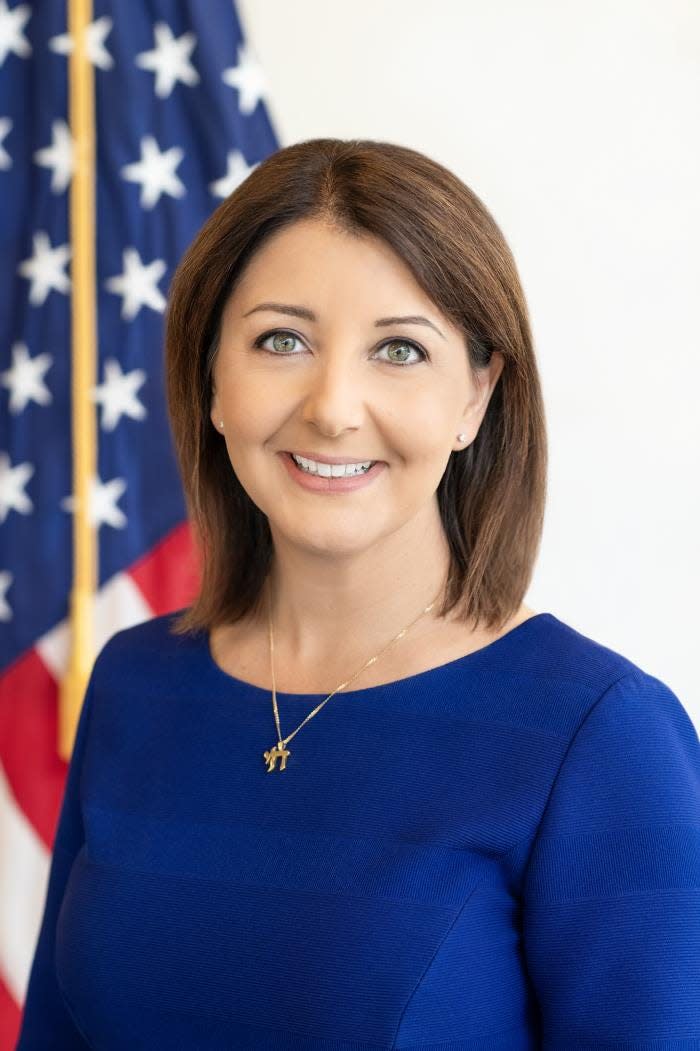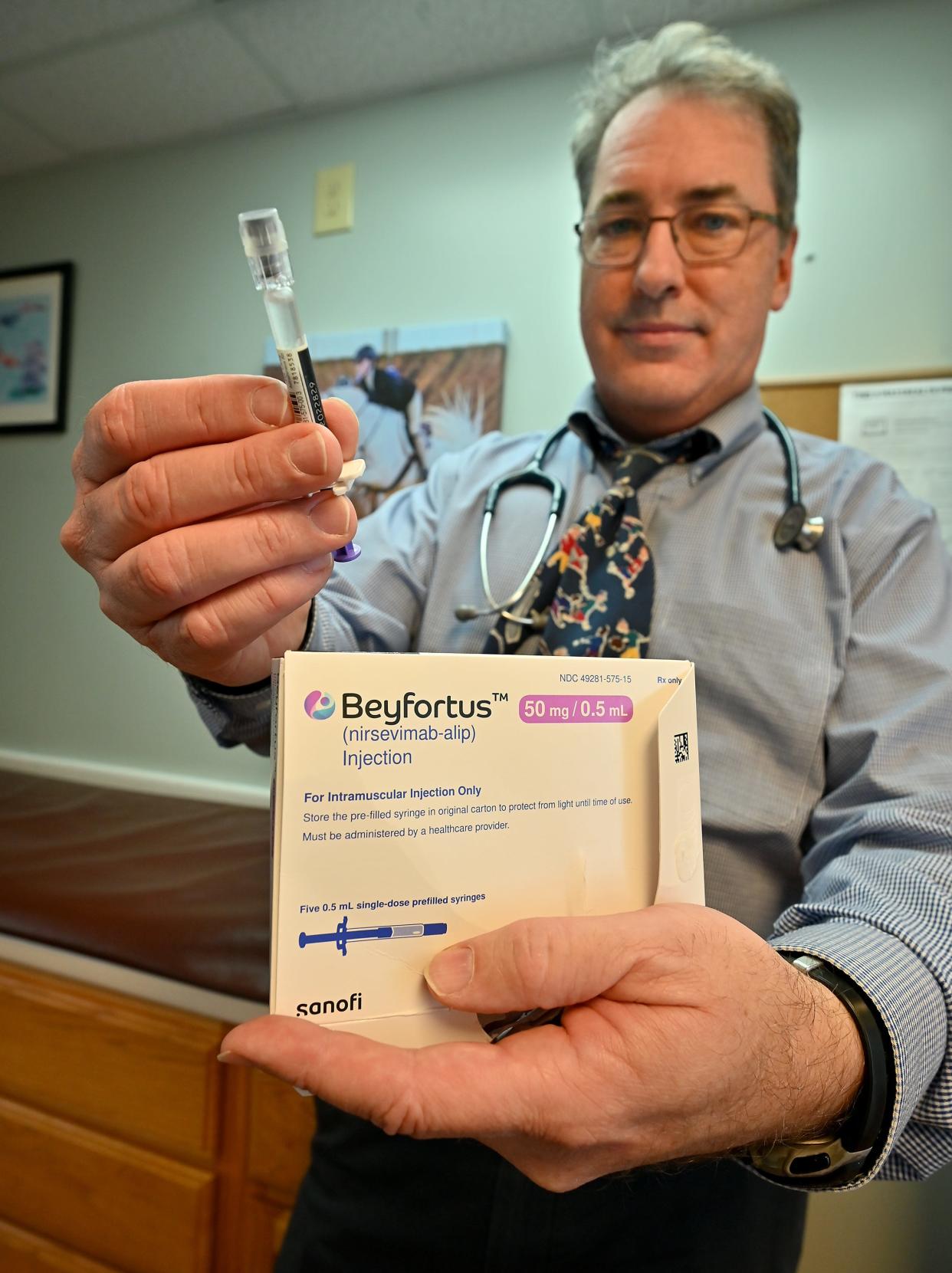Holiday season is also vaccine season: Here is the deal on RSV, COVID and flu shots
With the winter holidays in full swing, families and friends are gathering indoors for customary meals and festivities.
For many, the rush to get updated COVID-19 vaccines and flu shots before these celebrations has become almost as traditional in recent years as rounding up the fixings for favorite side dishes and desserts.
More: Opinion: I lost my husband to COVID-19; he was more than just a number
Now there are also vaccines for RSV, or respiratory syncytial virus, to consider to help tamp down respiratory viruses that pose a triple threat as the year comes to a close and a new one begins.
The Centers for Disease Control and Prevention issued a series of steps recently that people can take to “stay healthy during the holidays.”
More: American Academy of Pediatrics president: Why my children are getting the COVID-19 vaccine
Anybody who remembers the coronavirus pandemic updates from Mandy Cohen, the former secretary of the state Department of Health and Human Services, might recognize the tenor of the recommendations. Cohen was sworn in on July 10 as the 20th CDC director. She has encouraged anyone who’s eligible to get a flu shot and updated COVID vaccine.
“I know many people are thinking, ‘Well, I had COVID, or I’ve already been vaccinated,’ but this new COVID vaccine is updated to match the changes in the virus and restore protection that does decrease over time,” Cohen said in a video posted to Facebook and Instagram. “It’s similar to the flu shot you get every year. The updated COVID-19 vaccine is recommended for everyone 6 months and older, and it’s free for everyone — either through your insurance or through a CDC vaccine program.”
CDC Director Mandy Cohen: These vaccines are safe
This season there’s something new to help hold severe illness at bay. In October, the U.S. Food and Drug Administration authorized an updated Novavax COVID-19 vaccine for people 12 and older that offers better protection against XBB.1.5, whose lineage stems from the SARS-CoV-2 omicron variant. The North Carolina state health director issued a statewide standing order authorizing the use of the Novavax vaccine for anyone 12 and older.

Pfizer and Moderna have updated their mRNA shots to target the same variant, which was not covered by previous bivalent boosters.
“These vaccines are safe,” Cohen said in her recent video post. “They’ve been through extensive safety review through both CDC and FDA independent committees, academic groups and more. If you have concerns, please talk to your doctor or nurse practitioner. So let’s all make sure to have a happy and healthy Thanksgiving. Now is the time to get your shots to better protect you from serious illness from these viruses.”
Cohen’s new job puts her in a position of looking at the circulating infectious diseases through a national — and sometimes international — lens at a time when the federal vaccine program that was so prominent during the pandemic state of emergency has been phased out.
The private market is playing a larger role now, although free vaccines are still available at local North Carolina health departments and community health centers for the uninsured and underinsured through a federal Bridge Access Program.
The rise of RSV: How did it happen?
Here in North Carolina, Cameron Wolfe, an infectious disease specialist at Duke Health, has a similar knack for speaking about medical and scientific information in a clear and accessible way.
Several weeks ago the physician gave a presentation and answered questions about RSV, flu and updated COVID vaccines during a weekly meeting of LATIN-19, a North Carolina-based organization that coalesced during the pandemic to ensure that Latino communities get crucial health care information.

NC Health News has gathered questions some have asked about the circulating viruses and vaccines and used information from the CDC, FDA and Wolfe’s comments during the LATIN-19 meeting to provide answers.
Q: Why have we been hearing more about RSV in recent years?
A: RSV is “a highly contagious virus that causes mild, cold-like symptoms in most people,” according to the FDA. It’s a seasonal virus that is especially common in children, infecting most by the time they are 2 years old. Some infants and older adults, though, are more likely to become severely ill and need hospitalization.
During the first two years of the COVID pandemic, RSV cases dropped way off, largely because schools, daycares and many businesses were closed. It caused problems last year when it peaked when flu and COVID also were on the rise.
Q: How would you describe RSV?
A: “I think when we think about it, we think about it as the virus that causes young neonates to become critically unwell,” Wolfe said at the LATIN-19 meeting several weeks ago.
“Their lungs, when they are less than 1 or 2, are just not formed in a way that can handle this virus. But for older adults — you know someone who’s healthy — this would be a persistently annoying runny nose, sore throat and sort of a very much upper respiratory illness. But you can see here, when you get up into your 70s and certainly beyond, this is a major cause of winter hospitalization for older adults.

“While we don’t sort of have a mental image of RSV, it is a sort of co-circulating virus that does cause a lot of problems.”
RSV: Is there protection? What about infants?
Q: Is there protection against RSV?
A: The CDC has authorized two RSV vaccines for the prevention of lower respiratory tract disease in people 60 and older.
The Pfizer Abryvso vaccine is approved for use in pregnant individuals who are in their 32nd through 36th weeks of pregnancy.
Q: Is there anything available for infants?
A: An RSV prevention antibody immunization has been licensed and recommended for infants younger than 8 months old born during RSV season.
Is COVID-19 still a problem?
Q: Is COVID still here?
A: “I wish I wasn’t having to still sort of mention that,” Wolfe said. “But it is. For the fourth year in a row. We’ve had a light summer spike, and for the fourth year in a row, that has started to fade back down, thankfully not as severe as the amount of COVID we would typically see in the winter, but I think my way of looking at this is, it does sort of paint the picture that probably we’re going to continue to see COVID here for quite some time.”
Q: How about in the months ahead?
A: “I think it’s likely to expect that we get a winter period spike of this coming through in January, like we’ve had for the last three years,” Wolfe added. “There’s nothing new on the horizon about variants of COVID that concern me at all, so I just want to put that there to say so far we’ve had nothing in my mind but reassuring information in terms of the way our current vaccines are matching with what have been a series of … Omicron viruses. These have not shown to be more pathogenic at any point so far this year.”
COVID, flu, RSV — diagnosing the right illness
Q: Can clinicians tell, without testing, the difference between COVID, flu and RSV?
A: “I think it used to be easier in 2020,” Wolfe said. “These days … maybe you could say that influenza is sort of this quick onset, systemic muscle aching, joint aching, fatiguing sort of systemic illness.
“RSV, much more commonly the bad, persistent head cold, and COVID still occasionally comes in with more systemic features and sort of that classic loss of smell and taste we still see. But really, they’re blended together a lot. I can’t really sit in front of someone in a clinic situation and know which of these three that they’re going to have.”
Q: Are there home tests that can distinguish between COVID and the flu?
A: There are rapid tests that distinguish between COVID and flu, Wolfe said, “although they’ve been pretty hard to find and haven’t made their way into North Carolina to any extent.
“To be fair,” he added, “they’re not cheap.”
Three vaccines: Convincing the skeptical
Q: How do you persuade patients to roll up their sleeve for not just one, but three vaccines?
A: “COVID’s here now,” Wolfe said. “If someone says ‘I only want one vaccine,’ I would say COVID. We have good data that supports giving COVID and flu together if you’re only going to capture someone once. That’s actually quite safe.”
Wolfe added that it’s possible to give RSV, COVID and flu vaccines all in one sitting, but there’s not as much information about the side effects.
“Whilst that can be done, I’d pause and bring them back for their RSV vaccine,” he said.
Q: What do you say to people who shun vaccines, especially COVID boosters and the idea of an updated vaccine, because either they became infected with the virus or knew someone who did?
A: “I think one of the biggest failings — one of the real struggles — was our sense in the community, lots of people got the sense that vaccines weren’t working because people were still getting sick,” Wolfe said. “I want to really try and differentiate how I now speak about vaccines. Everyone was aware of this during COVID because it was all we were talking about, but exactly the same information is true for flu.”
Q: Does it take a lot of convincing?
A: “I love to talk about this with two measures of success that a vaccine can give you — the first is being simply what proportions of infections don’t you get,” Wolfe said. Additionally, he said, people who get “breakthrough” infections rarely are those who are hospitalized.
“The same with flu,” Wolfe said. “In a bad flu season, people in intensive care usually are unvaccinated.”
Q: What about someone who is relatively healthy with no comorbidities?
A: “We do occasionally still see long COVID, which I think is the other thing that I use when I discuss with people who may be a bit on the fence about COVID,” Wolfe said. “I would apply this to myself. This is something I don’t want to get. You know I’m a relatively healthy young adult, so I don’t think my fear of COVID severity is that great. But I sure don’t want to be knocked off my feet for a bunch of months secondary to a virus that I can certainly help prevent.”
Q: Who do you see asking for the vaccines?
A: “There’s almost no one these days who are unvaccinated and suddenly interested in a vaccine,” Wolfe said. “I don’t know who those people are. Mainly it’s people who already have had the vaccines who are interested in getting another one.
“And I think for them, the message is really clear: One dose, take your pick and you will be well covered heading well into next year.”
This article first appeared on North Carolina Health News and is republished under a Creative Commons license.
This article originally appeared on The Fayetteville Observer: Tis the season for vaccines? In a time of COVID, RSV and flu, how to stay safe
